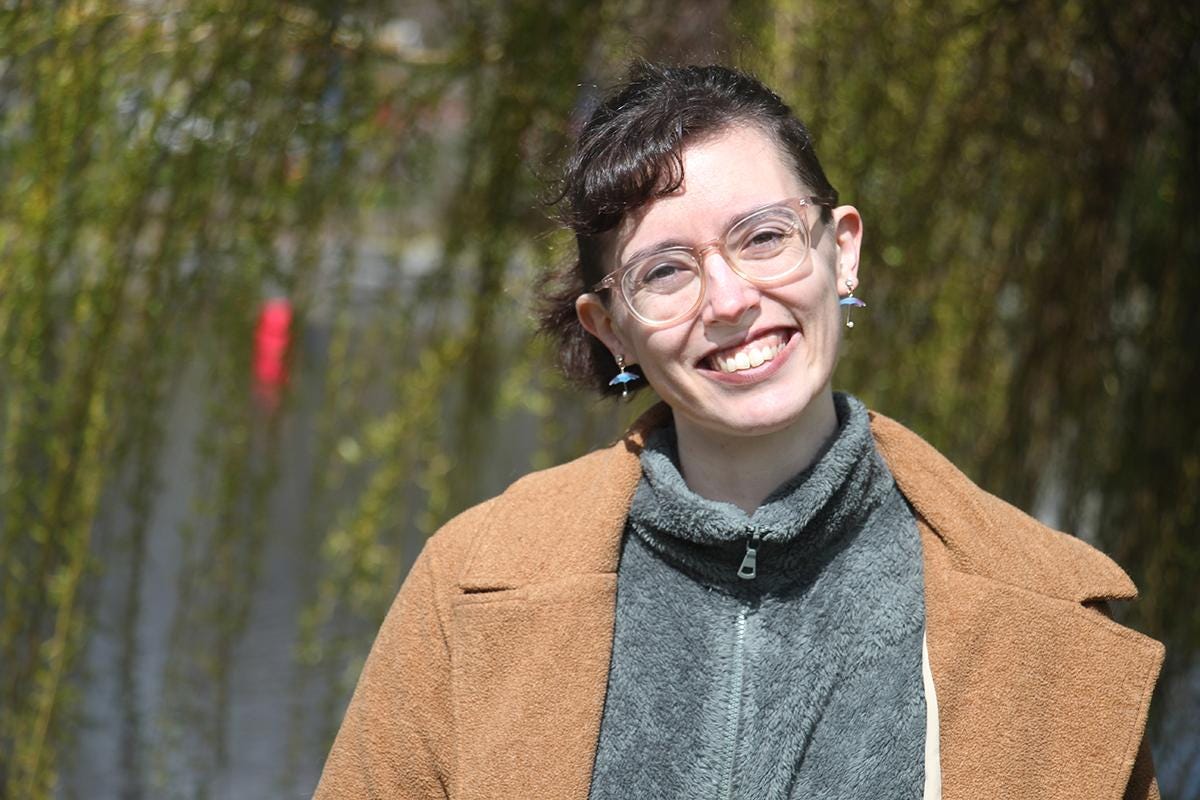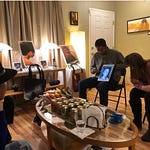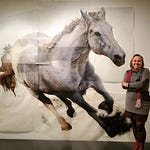The article was first published in the South Seattle Emerald in 2020 as “Does This Poem Bring You Joy?” The 2023 version of this article has been updated, expanded, and includes an audio narration with newly released interview excerpts. The article also includes transcriptions in Spanish, French, Swahili, Arabic, and Chinese.
Does this poem bring you joy? Does it move through and speak to your body? Does it make you think and feel something deeply? Can it unlock historical truths? Arianne True, a Choctaw and Chickasaw Nations poet and experiential educator, has important questions for all poets both young and old: How can the experience of poetry shape how you see yourself and history?
True began her trek into the wilds of poetry when she was just 15 years old. She had always written things, like many teenage girls who scribble things in their journals or in the margins of their notebooks. Poetry was something new and exciting for True but she had her preconceived notions about what poetry was and how she was supposed to interact with it and be impacted by it. But as she traveled deeper into the poetry landscape, she began to discover many hidden surprises.
When I interviewed True in 2020, she was 28 years old and had a deep sense of awe about how poetry could impact the body of the reader. She described her experience reading the poem He Sápa Three by Layli Long Soldier.
“If you want to keep reading the text right side up, like you've been taught to read texts, you have to physically rotate the book in a complete circle slowly while you read,” True said. “And that just totally expanded my mind on how poetry can interact with the body. Through the way she wrote she made me have to do a physical action to read her work. And that is so cool.”
True’s serious poetic journey began as a participant in Scribes of Ingraham, a Hugo House afterschool writing program at Ingraham High School in Seattle. That’s where she met her mentor Roberto Ascalon who helped her discover the pure delight of creating and experiencing poetry. She was inspired by the way Roberto interacted with the writing community, the slam poetry scene, and how he approached teaching the young poets under his stewardship.
“Roberto was always like very, very supportive but like very, very genuinely. He was excited about everything you did. And his credo is very much,” True interrupts herself to note how he impacted her own teaching style. “And this is how I teach now or at least how I try to, which is that ‘all writing is good writing because the act of writing is fundamentally a good act.’ And he taught from that place. So, it's hard not to get excited and inspired when someone really believes that everything you're doing is awesome.”
One of the most memorable assignments True received during her time in the Scribes program was purposefully writing something terrible—write something that intentionally ‘sucks’ was the task. And it was a surprising task but liberating. True felt freed from the confines of perfectionism that can bind so many beginning writers and stop them from pursuing the craft as a profession or even a hobby.
“And I was just like, whoa, what?” True’s voice rises. I can almost hear her smiling. “That completely changed how I write and how I think about writing? And that ended up being my favorite poem that I wrote the entire time.”
That experience influenced how True approaches the writing process. She understands that not everything a poet (or any writer) creates will be ‘good’ and it’s a way of writing that she wants to share with her students.
“I think the traditional workshop environment approaches poetry as a series of problems that need to be fixed. And I find that to be a bit soul crushing.” True said as she discussed her experiences in the mainstream academic poetry world. “…I think you get so much more when you look at it from a space of possibility. What is possible from this point? And like what are the different ways this can move? Or what are the things that maybe I didn’t intend but what do they have to offer? What do my mistakes have to offer?”
One of her most memorable moments from the Scribes program was being introduced to the poetry of Seattle writer Tara Hardy. True was about 15 or 16 years old at the time but she was impressed and inspired by Hardy’s skill.
“He [Roberto] brought in one of her poems and picked apart the form of it and showed us how she had made a new form in her poems and then had us do that,” True said. “And that just kind of blew my mind that you could interact with poetry that way, like you can just make forms and then you can see what other people are doing and just make those. It felt very personal.”
Arianne True, who was recently named the 2023-2025 Washington State Poet Laureate, has given back by working as a Hugo House Scribes instructor for a few years after finishing her MFA. And in a 2020 summer workshop, she and her students use poetry to explore African American culture, history, and art through the Northwest African American Museum (NAAM) digital collection.
“We forget that poetry is a really good primary source text for history and often deals with and shares a lot of truths that are written out of history textbooks, I think very intentionally,” True said. “So, I think you can get very good history from poetry…I want them to know that history is not set in stone and that they can interact with it and that they can tell their story any way they want,” True said as she spoke of her students. “And that their story is a part of and connected with history. There's no separation there. And I would like to have an impact on them so that they feel that poetry is a space where they can play and that they can try things out, and that writing in general is like a space for play.”
She mentioned the book Whereas by Layli Long Soldier, Zong! by M. NourbeSe Philip, and the many writings of Jordan Abel as examples of full-length poetic texts that engage with, question, and challenge historical documents that may offer, at best, only a partial truth.
“I'm a native person, there's so much about my history that is completely messed up in how it's told to nearly everyone in this country,” said True. “And a couple of those books, they offered this possibility of: We can tell it right and we can use the texts that people wrote about us to tell our own stories because we can. We can fill in the gaps and we can show how the way people have described us not us, but also shows how we have been treated. And it's all there in the texts.”













